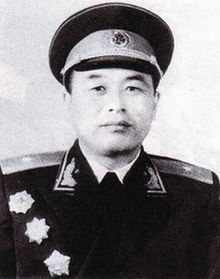Li Desheng (politician)
Li Desheng ( Chinese 李德生 , Pinyin Lǐ Déshēng ; born May 4, 1916 in Xin County, Henan Province , † May 8, 2011 in Beijing ) was a Chinese communist politician , general and a member of the Standing Committee of the Political Bureau of the Communist Party of China .
Origin and time of the Chinese Civil War
Li Desheng came from the poorest of backgrounds in the mountainous region of Dabie in Henan Province. At the age of eight he was already helping to support the family as a cowherd. His mother died when he was nine years old. After the Red Chinese Workers 'and Peasants' Army invaded his home village during the civil war in 1928, he joined their children's regiment, of which he soon became commander.
Two years later, at the age of fourteen, he joined the Chinese Red Army. In the following years he was a soldier in transport units and party secretary. From 1934 to 1935 he took part in the "Long March" where he was seriously wounded during a fight. Because of insubordination , he was the commander of the 4th Army, Zhang Guotao , from the Chinese Communist Party (CCP) excluded. However, he distinguished himself as a soldier in the following years.
During the Second Sino-Japanese War he served from July 1937 to September 1945 in the 129th Division of the 8th Army, where he rose from platoon commander , company commander , battalion commander to regimental commander . As such, he won several decisive battles, earning the reputation of Division Commander Liu Bocheng and the Division's Political Commissar , Deng Xiaoping .
In the following the Second World War following the Civil War battles against the National Revolutionary Army of the Kuomintang , he was appointed brigade commander and eventually even to division commander in the provinces of Shanxi , Shandong , Hebei and Henan. During this time he was instrumental in the victory over the Kuomintang.
People's Republic of China
Military career
After the founding of the People's Republic of China on October 1, 1949, he remained an officer in the People's Liberation Army .
During the Korean War from June 25, 1950 to July 27, 1953 he was first commander of the 35th Division and then deputy commander of the 12th Army.
After returning to China in 1954, Li remained in command of the 12th Army and was promoted to major general in 1955 . From 1957 to 1960 he graduated from the General Staff Academy. He then returned to his post as commander of the 12th Army.
During the Cultural Revolution , in the summer of 1967, Prime Minister Zhou Enlai asked him to fight burgeoning unrest in Anhui Province . In addition to his newly started political career, he first became a member of the Central Military Commission (ZMK) and head of the Political Department of the Beijing Military Region in 1969 , before becoming commander of the Beijing Military Region in 1971. In late 1973 he became the commander of the Shenyang military region , which encompassed all of northeast China. He remained in this post until 1985.
He then became political commissar and secretary of the party committee of the newly founded National Defense University in November 1985 . In 1988 he was promoted to general. In 1990, General Li Desheng retired.
Political career
At the 9th Congress of the Chinese Communist Party (CCP) , he was elected a candidate for the Politburo and a member of the Central Committee (Central Committee) in 1969. He was a member of the Central Committee until the 13th Party Congress in 1987.
At the 10th Congress in 1973, he was elected Vice Chairman of the CCP and a member of the Standing Committee of the Political Bureau of the Chinese Communist Party . Thus he belonged to the closest circle of the party leadership. However, he resigned from these offices in December 1975. Deng Xiaoping succeeded him as vice chairman of the CCP .
However, at the 11th CPC Congress in August 1977, he was re-elected a member of the Central Committee's Politburo. In 1985 he left the Politburo.
family
His wife, Cao Yunlian, is the honorary chairman of the YRM Foundation , a charity founded by the widow of top politician Chen Yun , Yu Ruo Mu.
His son Li Nanzheng also pursued a military career and was, among other things, Chief of Staff of the Shenyang Military Region .
Web links
- List of party conventions and leadership positions of the CCP
- Schoenhals, Michael: Cultural Revolution On The Border: Yunnan's Political Frontier Defense (1969-1971) , 2004
Individual evidence
- ↑ 原 中共中央 政治局 常委 李德生 逝世 . ifeng.com of May 8, 2011 (Chinese).
| personal data | |
|---|---|
| SURNAME | Li, Desheng |
| ALTERNATIVE NAMES | 李德生 (Chinese); Lǐ, Déshēng (Pinyin) |
| BRIEF DESCRIPTION | Chinese politician (People's Republic of China) |
| DATE OF BIRTH | May 4, 1916 |
| PLACE OF BIRTH | Xin County, Henan Province |
| DATE OF DEATH | May 8, 2011 |
| Place of death | Beijing |
